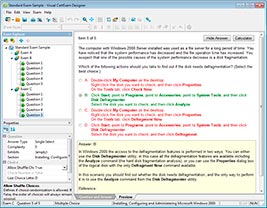Download Service Provider Design, Specialist Exam.JN0-1362.VCEplus.2024-11-02.32q.vcex
| Vendor: | Juniper |
| Exam Code: | JN0-1362 |
| Exam Name: | Service Provider Design, Specialist Exam |
| Date: | Nov 02, 2024 |
| File Size: | 767 KB |
How to open VCEX files?
Files with VCEX extension can be opened by ProfExam Simulator.
Discount: 20%
Demo Questions
Question 1
Your customer wants to enable their MX Series core so that a controller can dynamically manage their LSPs.
Which protocol provides this capability?
- BGP-LU
- PCEP
- PCRF
- BGP-LS
Correct answer: B
Question 2
What are two ways to provider redundancy in a WAN design to address physical failures? (Choose two.)
- Select products that use MC-LAG.
- Select products with different types of MICs.
- Select products that use multiple Routing Engines.
- Select products with different versions of firmware.
Correct answer: BD
Question 3
You work for a service provider that offers Layer 2 services. One of the customers is purchasing Layer 2 VPN services to interconnect several sites.
In this scenario, which two functions are provided by the PE router? (Choose two )
- It maintains all customer Layer 3 routing information.
- It selects the appropriate Layer 2 VPN in the service provider network.
- It maintains an MP-BGP session with each customer site to exchange customer routing information
- It maintains MPLS LSPs between the sites.
Correct answer: AC
Question 4
You are asked to create a point-to-multipoint DCI that does not overwhelm the data plane with MAC learning traffic.
Which protocol would you use in this situation?
- VPLS
- PPTP
- EVPN
- pseudowire
Correct answer: A
Question 5
You are designing the physical redundancy for a service provider network and are checking for potential risks due to fate sharing.
Which two sources of fate sharing should you examine in this scenario? (Choose two.)
- hardware vendor
- MPLS LSP
- building location
- fiber conduit
Correct answer: BC
Question 6
Which three statements are true about class-of-service (CoS) schedulers? (Choose three )
- Schedulers determine into which queue a packet should be assigned.
- Schedulers determine the packet transmission rate for each queue.
- Schedulers determine the packet markings that are used to prioritize traffic.
- Schedulers determine how packets are handled during times of congestion.
- Schedulers determine the size of buffer assigned to each queues.
Correct answer: ABD
Question 7
You are developing a CoS policy for a service provider core network that In this scenario, which three statements are correct? (Choose three.)
- Core routers should use a common set of per-hop behaviors.
- Core routers should use shapers to ensure that customer traffic does not exceed allowed bandwidth.
- Core routers should use policers to ensure that customer traffic does not exceed allowed bandwidth.
- Core routers should use a consistent CoS configuration across the network.
- Core routers should use the DSCP markings already set on ingress traffic.
Correct answer: ACE
Question 8
A customer wants to consolidate all remote site connections into a single enterprise WAN for backhual to the corporate headquarters and data centers.
Which solution satisfies this requirement?
- private WAN
- WAN aggregation
- Data Center Interconnect
- Internet edge
Correct answer: C
Question 9
You are asked to provide a design proposal for a service provider network that will need to support both IPv4 and IPv6 traffic across your IPv4 core. You do not want to change the core design.
In this scenario, what are two solutions that you would implement at the peering edge? (Choose two.)
- 6PE
- NAT64
- GRE tunneling
- native IPv6 routing
Correct answer: AD
Question 10
You work for a service provider who wants to provide a service to your customers consisting of VoIP, live TV, video on demand (VoD), and data services You want to use a hybnd VLAN model for this service Which VLAN assignments would be used for this deployment?
- Video services will reside in a shared video VLAN. and the customer willHjttlttjftvo data VLANs assigned, one for voice and one for data.
- Live TV will be multicast to all customers, video on demand, voice, and data will share a customer specific VLAN.
- Live TV will be multicast to all customers, video on demand and data will share a customer specific VLAN, VoIP will use a shared VLAN utilizing private VLANs to talk to a telephony server.
- Live TV and VoD will be in the same shared VLAN with Live TV on a multicast stream and VoD unicast, voice and data will reside in a customer specific VLAN.
Correct answer: C
HOW TO OPEN VCE FILES
Use VCE Exam Simulator to open VCE files

HOW TO OPEN VCEX AND EXAM FILES
Use ProfExam Simulator to open VCEX and EXAM files


ProfExam at a 20% markdown
You have the opportunity to purchase ProfExam at a 20% reduced price
Get Now!



